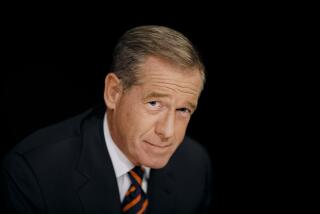Jennings adapts to new era
- Share via
BOSTON — It was 8:30 p.m. Eastern time Monday and ABC News anchor Peter Jennings wanted the camera to cut to him so he could make a comment about something happening on the floor of the Democratic National Convention. He rapidly opened and closed his hand -- a common off-camera gesture for talking -- trying to get the attention of his floor manager.
Eventually, Jennings made his point. But was anyone in America, other than ABC News employees, listening?
Jennings wasn’t broadcasting on the ABC Network, which, like NBC and CBS this year, is offering just three hours of prime-time convention coverage all week. Instead, ABC mounted a last-minute, low-budget effort to have Jennings anchor for several hours each night for a decidedly different environment, a newscast that can be seen by some Internet subscribers and on high-number digital TV channels in major cities including Los Angeles and New York. The experiment will run for 14 weeks, through the election.
Jennings, who calls the effort a “guerrilla operation,” sees the digital channel/webcast as a potentially visionary move that could eventually be the standard operating mode as younger viewers shun the networks for alternative media. In four to eight years, he said, “this may have been a pioneering effort,” adding that the operation “has the suggestion of a new world order.” But he admits, “We’re doing this because we’re up against a reality. The network will only give us an hour a night.”
This means that while NBC’s Tom Brokaw holds forth on the convention from a sky box above the floor, Jennings spends much of his time squirreled away in a cramped two-room hideaway with concrete floors, curtain dividers and a rolling metal cart for a TV stand. It’s convenient for his frequent forays onto the convention floor, but when Jennings is on air from the studio, viewers see a fake backdrop.
NBC still pays for prime real estate because it has a full cable news network, MSNBC, to share its coverage and costs. ABC has no such outlet, because it decided years ago to abandon its own launch of a cable news network, and a hoped-for CNN merger never came to fruition.
ABC’s competitors paint a picture of Jennings and his team as voices talking into the void, with no one listening or watching.
“I understand their frustration,” said Mark Lukasiewicz, the executive producer of NBC News’ political coverage. “They only have one platform, and they are trying to find another.” But he said NBC, in addition to MSNBC, also airs its reports on CNBC and Spanish-language Telemundo, among other places.
Jennings says his rivals are also frustrated at network cutbacks. “The truth of the matter is, we are all of us frustrated. We come to these quadrennial events and then we don’t get to talk about it ... so of course that’s going to be a cause of frustration.”
Monday night’s Web traffic was encouraging. From 7 to 11 p.m. Eastern time Monday, ABC drew 210,000 users on AOL, making it the largest “live streaming event” ever on the online service. Tuesday did better, with close to 250,000 users. But such numbers are still a pittance compared with the 4.4 million viewers who watched convention coverage on ABC’s TV channel for the hour on Monday.
The digital operation, which is called ABC News Now, has had some successes. Guests such as former Democratic candidates Howard Dean and Al Sharpton chatted with Jennings on Monday night, apparently unconcerned about how many would or wouldn’t be watching. “No one has said no to us, to the best of my knowledge,” Jennings said.
But there have also been technical glitches, as well as hours of time to fill. When the jacket-wearing Jennings isn’t on the air, the channel, which is up 24 hours a day, sometimes has a man in a T-shirt reading mail.
More to Read
The biggest entertainment stories
Get our big stories about Hollywood, film, television, music, arts, culture and more right in your inbox as soon as they publish.
You may occasionally receive promotional content from the Los Angeles Times.










